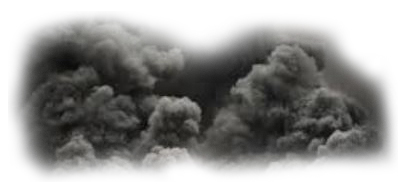
“The
Wrath to Come”

“Jesus, Who delivers us from the
coming wrath.”
(1 Thessalonians 1.10)
How
fond we are of saying — and with such conviction
— vapid things of the following sort:
-
“The
ripple caused by a pebble dropped in the ocean touches
every shore”
-
“One
single drop added to the water, affects the entire
lake”
-
“Each
time you start your automobile, use your electric
razor, however fractionally measurable, you contribute
to global warming”
-
“What
goes around comes around”
To utter such profundities makes us feel ... philosophic,
wise, deeply discerning, even “earth-connected”
and “mother-earth friendly” ... and who would
possibly wish to offend such “earth-people” as they
articulate popular physics through New Age nuance.
However conceptually correct such statements
are, they are deeply disturbing because they are not
simply moral apostrophies — pretending to address deep
ethical issues through brainless bromides masquerading
as moral utterances — but moral impostures that deliberately
prescind from far deeper issues still; issues involving
sanctity and sin.
“Earth-friendliness”, our overweening concern for oceans,
lakes, dwindling polar ice caps and ozone layers are
acceptable and polite venues for our concession to the
fact that what we do has not only measurable effects,
but lasting effects ... some even irreversible. And
some even eternal.
“Mother Earth” vs. God
the Father
How fiercely we defend
“mother earth”... even divinize it, as we repudiate
God the Father. Our “awareness” of the presumed
laws of the one we hold as emblematic of our “enlightenment”,
while the Laws of the Other we contest, deny, or altogether
abrogate ... also as emblematic of our enlightened distance
from what we smugly deem a “primitive notion of God”
— choosing, instead, a less primitive worship of mother
earth ...
This is the by-product, the effluence really, of a generation
nurtured on the moral nihilism that has leeched to our
own children from the bygone “Age of Aquarius” through
which their parents depredated and transvaluated every
notion of the authentic good in exchange for
euphoria, sexual license euphemized as “free
love”, and the disdain for all authority in Heaven and
on Earth. It was an age of distributed relationships
and, consequently, abolished responsibilities; “communal
living” as the microcosmic welfare state.
The point of the
matter is that New-Agers and Aging-Aquarians alike equally
recognize the nature of the notion of consequences.
Despite the best efforts of philosophers — and more
recently, theologians — we cannot acquit ourselves of
this conviction. There are consequences to our behavior
in this world. And in the next. We either prefer not
to think of the latter, or we find a Church (or make
one) that will absolve us from these consequences, and
even claim to nullify them.
Every action has a consequence, we all agree. Everything,
oddly enough, but sinful behavior (I say “behavior”
because it lends itself to being understood in physical
terms, in other words, in terms we recognize as entailing
consequences, and which are more immediately evidential
in nature). Uncertain of our own specious reasoning,
we adduce support for our wishful thinking from philosophers
and theologians in Catholic universities who assure
us that no such consequences obtain in the moral realm
any longer, and any vestiges are largely discredited
artifacts from an earlier, “less enlightened” Church
... however historically and spiritually closer it was
to Christ. And this “church”, they assure us, is shedding
its skin as a snake ...
However they attempt to rehabilitate our perversity
and sin and “christen” them as “persuasions” and “choices”,
we are still left in the dark watches of the night —
especially as we grow older and begin to scan the obits
— somehow uncomfortable with this tenaciously atavistic
notion that everything, that all behavior, has a consequence
... except sin. We begin to dwell on the encroaching
reality that this life is not a “rehearsal”, that we
cannot hit “replay” and do it right this time ... or
simply place a mouse cursor over our enormities and
simply delete them.
We even begin to entertain the notion that the ruined
lives of others over whom we have walked in attaining
our now strangely dwindling euphoria, our success, our
wealth, our power, our pleasure ... will somehow call
us to account, as an effect invokes a cause, and that
we cannot extricate ourselves from it. If it doesn't
give you the shivers, it should. 74 people in Boston
alone crossed that bourne last night
The pebble, the teaspoon of water, becomes less charming
... and we begin to suspect that what holds true for
blameless things, may hold true for things far greater,
far more reaching, far more lasting, in which the notion
of blamelessness plays no part ...
“The coming wrath.”
How quaint ... even as it oddly, irresistibly ... and
somberly, resonates within us ...
Rather like that unshakeable notion of sin and accountability.
It rattled Saint Paul. But he was a quaint fellow after
all ... wasn’t he? Much like his Master.
Editor
Boston Catholic Journal